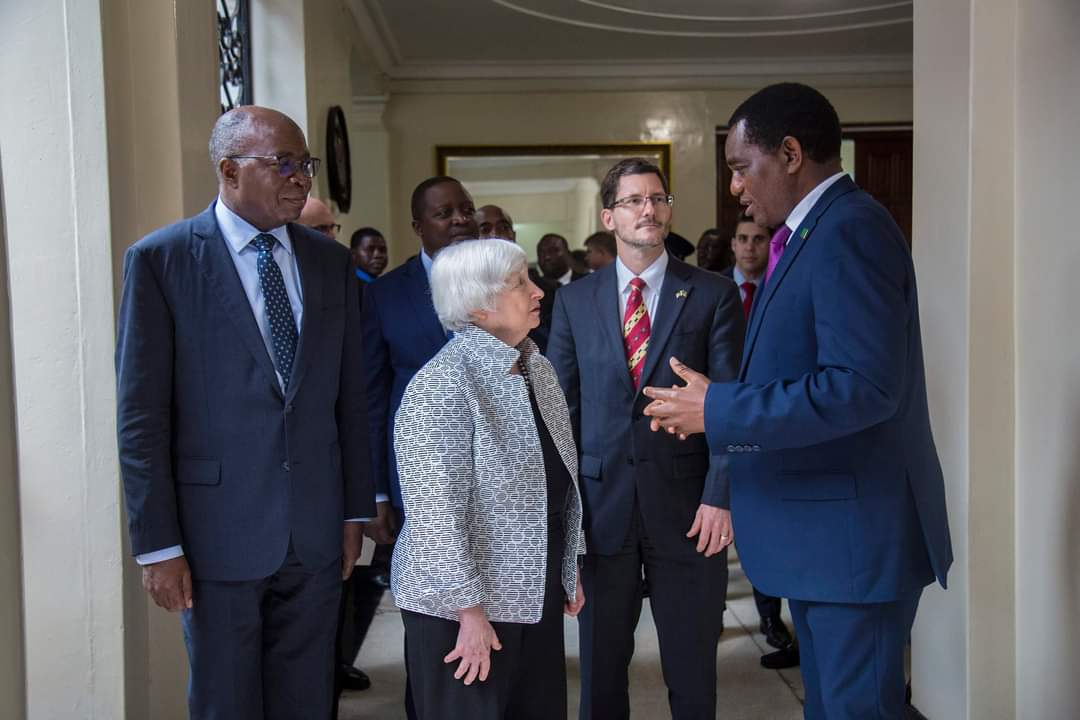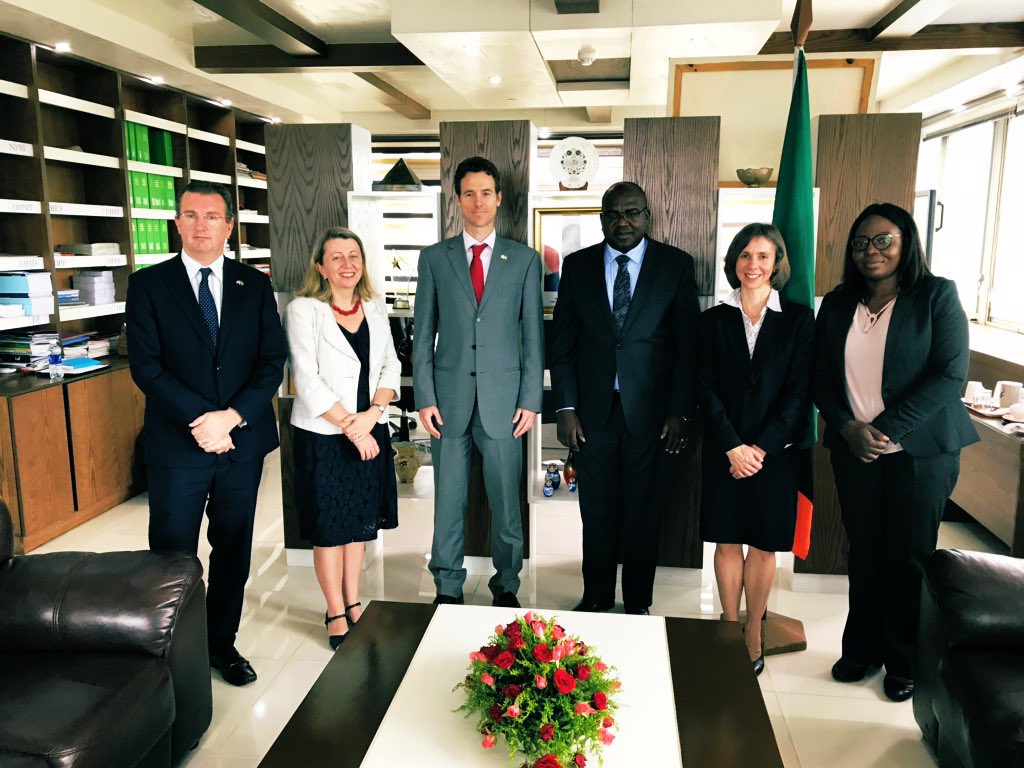CUTS calls for a robust strategy to get the most out of debt negotiations with the Official Creditors Committees, including China
Notice: Undefined index: catFilterList in /home/zambi/public_html/wp-content/plugins/wp-likes/api.php on line 243

International Monetary Fund (IMF) Managing Director, Kristalina Ivanova Georgieva-Kinova (Second from Left) welcomed at State House in Lusaka by President Hakainde Sammy Hichilema (far Right).
CUTS calls for a robust strategy to get the most out of debt negotiations with the Official Creditors Committees, including China
By Saeed Simon, Banda, Henry Chunza, Muleya Idaho Chongo, Malvin Nkhoma and Derrick Sinjela
THE Sunday, 22nd to Tuesday, 24th January, 2023 visit by International Monetary Fund (IMF) Managing Director, Kristalina Ivanova Georgieva-Kinova, themed ‘Zambia towards a More Resilient and Inclusive Future’ has been of notable importance and a great opportunity for Civil Society Organisations (CSOs) and interested stakeholders to share perspectives and concerns on future programme support , says an optimistic CUTS international Lusaka CUTS Country Director Angela Mulenga.
However, Ms. Mulenga frets (fears) that the current debt load continues to pose a threat to Zambia’s economic growth and development , that is masked by high income Inequality, high poverty and high unemployment.
A worried Ms. Mulenga cites the overhung on the economy and China’s delay to strike a deal due to the significant development challenges, it is facing, as being a barrier to resolving the problem.
Although an understanding principle has been reached, Ms. Mulenga regrets that there isn’t a consensus in China to accept upfront haircuts on the debt it owns.
“Given the circumstances and diversity of Zambia’s creditors, CUTS is of the view that a strong strategy is required to get the most out of our negotiations with the Official Creditors Committees,” grieves Ms. Mulenga in a Wednesday, 25th January, 2023 Press Statement circulated by CUTS international Lusaka CUTS Country Communications Officer, Nancy Mwape Kalindi.
Further to the herculean lack of clarity on how to resolve the Chinese debt burden, CUTS recommends a seven – pointed policy intervention for consideration in the process of debt restructuring.
First, Ms. Mulenga is seeking a need for clarity on what would happen in the event that Zambia does not bring ninety percent (90%) of the creditors to the negotiating table.
“Holdouts could scrapper the whole process and lead to aggressive behaviours from vultures and hedge funds. The consequences of litigation at this level can only be contemplated with a sense of distress,” warned Ms. Mulenga.
Secondly, Ms. Mulenga commended the Ministry of Finance for their continued commitment to publishing information in relation to Zambia’s debt situation.
“Nonetheless, publishing a timeline of the debt restructuring process for the benefit of the citizens to follow and to in-put remains our concern. There is a lot of information that is materially non-price sensitive and needs to be shared with the public domain. Hiding information and omitting disclosures only breeds unhealthy suspicion,” advised Ms. Mulenga.
Thirdly, expediting amendment of the Public Debt Management Act (PDMA) 2022 being be prioritized by the Government to include provisions relating to Collective Agreement Clauses (CACs) and the priority of payments addressing excluded claims is highlighted as a concern by Ms. Mulenga.
Fourthly, in recognition of the significance of increased access to public information and ensuring the effective regulation of public debt, inclusive leadership, improved lives of the vulnerable and marginalized and all Zambians, Ms. Mulenga called for the enactment of the Access to Information (ATI) law remains important.
“This will be key in holding duty bearers accountable, ensure transparency and the prudent use of public resources, while strengthening the fight against corruption, especially during the debt restructuring process,” noted Ms. Mulenga.
Fifthly, Ms. Mulenga called for fiscal policies which aim to prioritize social spending, limit mismanagement of resources and encourage transparency to lessen corruption.
“As such, an effective and transparent public procurement system should be implemented in order to create jobs and achieve socio-economic development which is key in ensuring that Zambia’s growth is more resilient, inclusive and sustainable for the improvement of citizens welfare,” said Ms Mulenga.
Ms. Mulenga’s sixth concern is that with the IMF agreement now on board, a need for the national budget, a critical policy document to the restructuring process to be in tandem with the Eighth National Development Plan (8NDP), devised to unlock the country’s potential in key sectors of the economy such as agriculture, climate change, energy and tourism must be prioritized.
“This will be important in supporting the government’s policies and institutional reforms aimed at sustainable and inclusive national development,” prodded Ms. Mulenga.
Lastly, as a CUTS seventh recommendation, Ms. Mulenga remains hopeful that just concluded IMF visit has reassured Zambian citizens who have been unsettled about the effectiveness of the IMF support programme.
“It is hoped that it will further accelerate the progress on ongoing discussions with creditors on resolving technical issues and achieving timely restructuring agreements, which are essential to secure the expected benefits of the Fund-supported program,” observed Ms. Mulenga.

CUTS international Lusaka CUTS Country Director Angela Mulenga

Angela Mulenga
CUTS International Lusaka Country Office has been operating in Zambia for over two decades (0ver 20 years) under five (5) thematic areas; Economic Governance, Trade and Development, Consumer Welfare, Gender and Governance and Climate Change and Development with the ultimate goal of promoting consumer sovereignty.


















